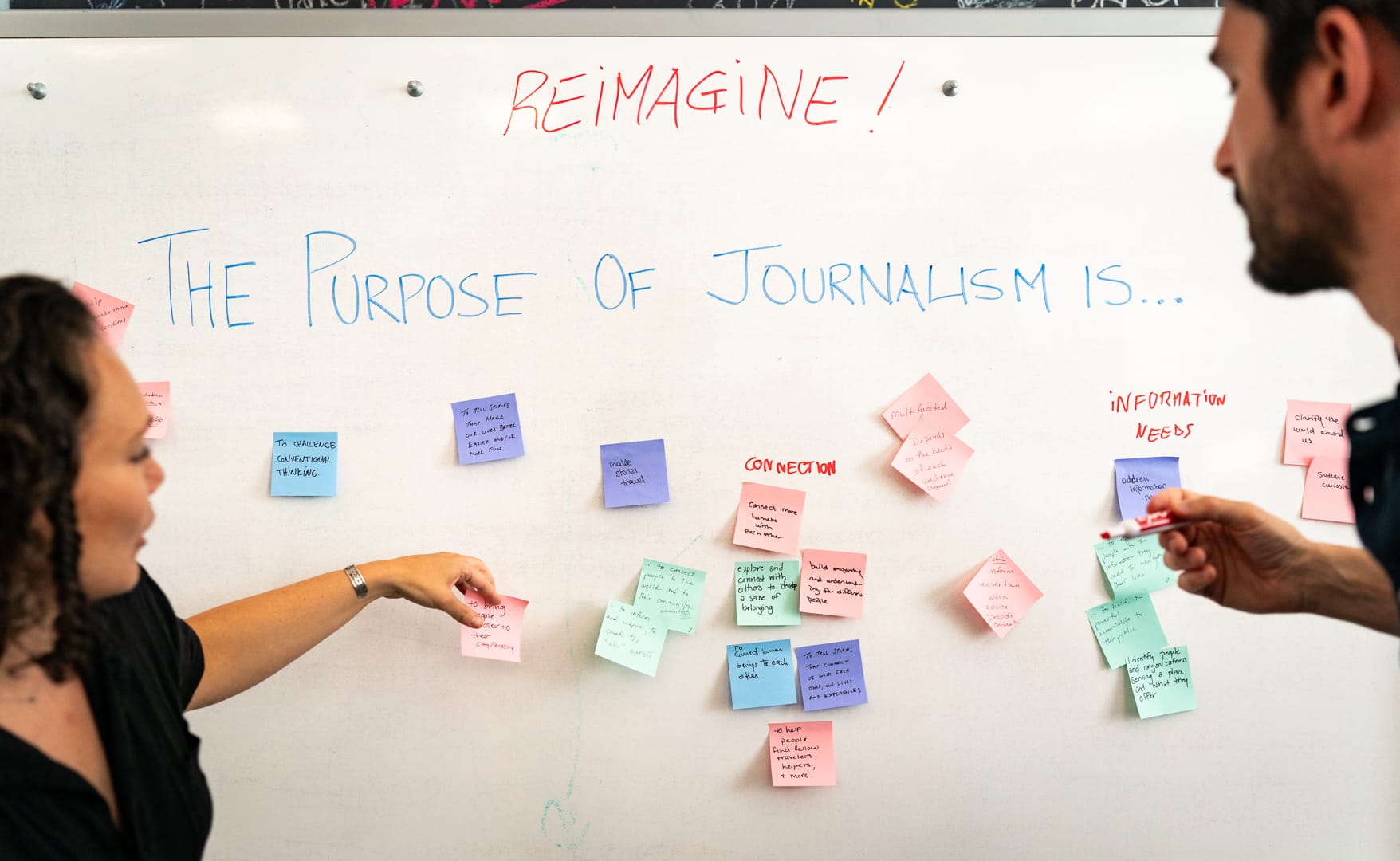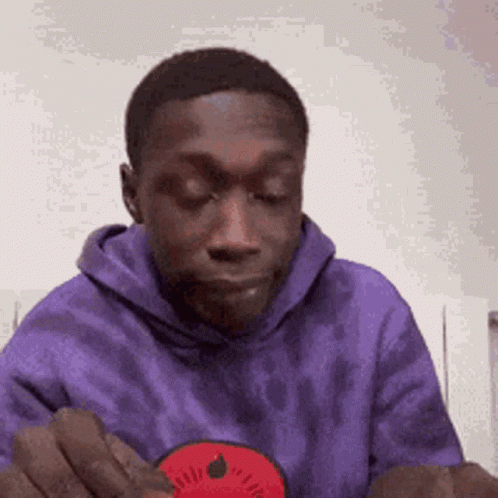🔶 #24: "You are not here to save journalism. You are here to redefine it."

Hello and welcome back to the News Alchemists newsletter!
And a first welcome to new subscribers from Berlingske, WAN-IFRA, Democracy Fund, Schibsted, Maldita, Wick Communications, Al Jazeera, TRF, ABC, USC Annenberg, and Maharat Foundation 👋 You're among friends.
This is the last email I'm sending from Evanston, Illinois, before traveling back to London later this week. The time I've spent here at Northwestern University has been incredibly rewarding – rich in meaningful conversations about the purpose of journalism and what it should enable us to feel, think, and do.
Soon I will be sharing more about those conversations and what I learned from them, but the downside of such an intense experience is that, now that I'm almost at the end of it, I feel eeeexhausted... So after failing for the last thirty minutes to come up with something meaningful to share in this introduction, I decided to say, you know what, let's go straight to the links 📚
See you next week! 👋

Time-out: the 2025 DNR is out!
Big day for our industry, as always in mid-June: the Digital News Report 2025 has just been published, a must-read to understand how people's relationship with journalism is shifting.
This year's report includes findings on local news, misinformation, the changing face of podcasting, the rise of news influencers and people’s attitudes towards personalisation, generative AI and mobile news alerts. It also includes data on trust in news and news avoidance, details about news use on different digital platforms, and insights from markets in Europe, Africa, Asia and the Americas.
This is the last DNR authored by 🧞Nic Newman, who has been leading the creation of this invaluable resource since 2012. Thank you, Nic.
1. You are not here to save journalism. You are here to redefine it. 👉 LINK
Stop what you're doing and take 15 minutes to listen to 🧞Candice Fortman – the former executive director of 🧩 Outlier Media – giving the commencement address for the UC Berkeley Graduate School of Journalism Class of 2025.
Some quotes that stood out to me (only three or I'll end up quoting the whole speech):
"Journalism could be more than reporting. It can be protection. It can be power. It can be love."
"We don't need to gatekeep journalism. We need to open the gates and let communities walk in with us. We win by building stronger ecosystems."
"Journalism doesn't have to just watchdog power. It can help return power to the people."
2. How UK local news entrepreneurs are building sustainable businesses 👉 LINK
Back in the 12th edition, I shared a New Yorker story about the vibrant London local news scene, mostly fuelled by a bunch of excellent up-and-coming newsletters. But independent local news outlets are also thriving across the UK – as this journalism.co.uk article explains by highlighting three of them.
Personal fav: 🧩 Ipswich.co.uk, an independent local media company with a clear value proposition – "Purposeful journalism for people who care about our town. No ads, popups, paywalls or tracking. Just purposeful local journalism that respects your time, attention and privacy." – and a clean beautiful website that includes a 'Good News' section to highlight 'everything positive that’s happening in Ipswich'.
3. The limits of both data and intuition 👉 LINK
Another great newsletter by 🧞Patrick Boehler, so dense in deep and valuable insights that I had to ask my friend NotebookLM to help me summarise them:
Boehler argues that successful publications often fulfill deeper psychological needs beyond simply providing functional information. He proposes that media should be approached as experience design, focusing on emotional resonance, and suggests a 'nested value' concept where functional benefits are surrounded by layers of emotional and community connection. The author emphasises the importance of embracing uncertainty and building small, agile ventures that truly understand and cater to the audience's lived experiences and emotional landscapes, rather than chasing false certainties through overly rigid research or relying solely on editorial genius.
4. Can we fix the news? One crazy idea at a time 👉 LINK
One thing that makes me really happy is chatting with new subscribers and learning about the cool projects they are working on. Earlier this year, 🧞Ju Park started a blog series to explore "bold, experimental product ideas that aim to fix one big problem: How can we make reading the news more fun and engaging for everyone – across all generations?" I love the concept, and the execution is just as good.
Take Agora for example: Ju describes the product idea ("A minimal, black-and-white app where you can curate your daily top 5 news articles and share them with your friends. Think of it as a social leaderboard for news nerds."); shares what need it's meant to serve ("The idea came from something I kept noticing in my own news habits: Reading the news is often a very lonely activity."); shows how she actually built a prototype of it; and reflects openly on limitations and concerns.
5. Direct audience relationships are non-negotiable. 👉 LINK
I've been a big fan of 🧞Sam Guzik since we met on the Media Party stage last summer in Buenos Aires. Recently, Sam led a scenario-writing workshop at an event that explored AI’s impact on the news industry, and two of the takeaways he shared in this post really stood out to me – especially considering that they came out of a workshop that had AI as the main topic:
"Direct audience relationships are non-negotiable. Every positive scenario involved publishers building stronger connections with their communities rather than chasing platforms for algorithmic growth."
"Most starkly, the scenarios highlighted the difference between building a future for 'news' and a future for 'news organizations': Some of the bleakest worlds participants considered included sustainable news organizations. Some of the most optimistic paths included a thriving network of civic information, but didn’t involve traditional journalists."

6. From €10M in losses to €25M in EBITDA: How Le Monde built a sustainable model 👉 LINK
Seven editorial, tech and marketing decisions that have powered 🧩 Le Monde's consistent growth over the past decade and a half. A great list that proves that innovation starts with mission and with people – not with technology.
7. Kommentar-Überblick: a step towards better dialogue with the help of technology. 👉 LINK
Two references to AI in the same edition is quite out of character for this newsletter, but when AI is used to improve the user experience and to foster dialogue (rather than to chase meaningless efficiencies) I'm all for it. And that's the case for this product release presented by 🧞Uli Köppen – chief AI officer at German public broadcaster 🧩 Bayerischer Rundfunk (BR) and one of the founding members of News Alchemists:
"Our teams have been working on a comment digest. It's a summary of comments discussing news articles. Those summaries support easy access to dialogue. Instead of sifting through large amounts of comments (and sometimes hate and bad feelings), you can jump directly to the topic you want to discuss. Our users get an easy overview of the topics discussed and can enter into a conversation about news topics without losing time and energy. It's not a shiny AI rocket. It's a step towards better dialogue with the help of technology."
What is this newsletter?
The relationship between journalism and the people it aims to serve is broken. But we can heal it if we learn to put audiences and communities at the centre of everything we do. The News Alchemists newsletter wants to help you to do just that.
Every week I share seven links to give you some hope and to introduce you to the many smart, kind, and courageous people (🧞) who strive every day to use journalism as a force for good in society – and to the organisations (🧩) that show us that a different journalism is possible, and profitable.
To respond to this newsletter, just hit reply. I love hearing from you and reading your questions, comments, and suggestions.
If someone forwarded you this email, and you'd like to receive it too, sign up here.
And if you liked this newsletter, give it a thumbs-up below. It's a small thing, but it makes me happy big time 👇
📸 The header image is not connected to the content of the newsletter. Just a photo taken by me to add a little colour.


Member discussion